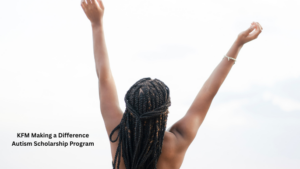Buy Kerry’s nonprofit a cup of coffee here
This guest post is by Brielle Williams, a young woman on the autism spectrum who was accepted into Brigham Young University. Brielle is applying for the Spring 2021 Making a Difference Autism Scholarship via the nonprofit KFM Making a Difference started by me, Kerry Magro. I was nonverbal till 2.5 and diagnosed with autism at 4 and you can read more about my organization here. Can I ask for a favor? I’m trying to make this nonprofit self-sufficient so I can make this my full-time job supporting the special needs community and would appreciate you taking a minute before reading on to watch this video below and subscribing to our Youtube page here to get to learn more about the work we do in the community.
Posted by Kerry Magro on Thursday, January 7, 2021
I hope you can support my nonprofit like I’m trying to support these students with scholarship aid for college. Learn more on how you can help our cause with a small donation (just asking for $3 today, equal to your daily cup of coffee) here.
I was 14 years old when I received my autism diagnosis and everything seemed to click. I’d never really had people I was close to or even friends for that matter. I could never eat in the cafeteria, and spent most of high school eating in hallways or blocked off areas to avoid the noise. I always did well in school, mainly because my mind moved a hundred miles a minute, but I could never practically apply any of the problem-solving skills I learned. Meltdowns were a common occurrence. I was too stressed out, too annoyed, too out of it. I started acting to cope with not liking who I was. It’s easy to pretend to be someone else when you don’t even know who you are, and it doubled as an escape from the dissatisfaction I felt within my own life. In doing so, I won Best Actress three years in a row at my high school, as well as being named Colorado’s Rising Star in 2017. But I wasn’t happy.
I was 17 years old when I finally came to terms with everything. Not everything for me would be “normal,” in fact it would all be the opposite of that word, but it would also be okay, because what is normal anyway? I certainly couldn’t tell you. Couldn’t point at a person and declare that they are normal because no one really is. I finally started to talk about how autism impacted my life and how it made me different from other people. Lots of people told me that I “wasn’t actually disabled” or that I “didn’t look autistic,” but I loved myself anyway. I knew who I was and no one had the right to tell me otherwise. Self-acceptance was the first step to self-love, and to accept myself I had to forget about all the people who didn’t accept me. The process was cathartic, leaving behind people who only dragged me down in the past. “Friends” that had called me crazy to my face and behind my back. In doing so, I started to feel less “crazy” and more like myself. Sure, I still had meltdowns and couldn’t be in large crowds but I at least understood why. I pushed everyone aside and continued to excel, receiving top honors from my principal two years in a row while also graduating as a salutatorian. I started feeling happy.
I was 18 years old when I was asked to feature in a podcast geared to autistic parents. I didn’t think I had anything to say, but I did it anyway. Parents needed to know that a child with autism isn’t a failure and they still have a future. A diagnosis isn’t a sentence. Whether a child has an official diagnosis or not, they may still struggle. Putting a medical name on your child’s struggles is so hard, but there are so many misconceptions about autism that it’s nice to see an actual autistic person succeed, even if that success is just getting into a good college and having large aspirations for the future. I’ve never felt like I couldn’t succeed because I was autistic, but I have felt pressure because I’m not exactly the typical person. After the podcast aired, I got a lot of DMs online. Parents were reaching out to thank me. I felt like I did something good. That despite how hard everything was, no is, for me, I still push forward. And now, I’m finally happy.
I still can’t live life like the elusive “normal” person. Thinking about working a job where I have to interact with people while dealing with overwhelming smells and sounds makes me a little bit nauseous. I can’t wear jeans or tights or long sleeve shirts. I have a handful of friends, but not many. I spend a lot of time wrapped up in hobbies that might not be important to other people. And that’s okay. Because that’s who I am, and why would I ever want to change that.

Follow my journey on Facebook, my Facebook Fan Page, & Instagram!
My name is Kerry Magro, a professional speaker and best-selling author who is also on the autism spectrum that started the nonprofit KFM Making a Difference in 2011 to help students with autism receive scholarship aid to pursue a post-secondary education. Help support me so I can continue to help students with autism go to college by making a tax-deductible donation to our nonprofit here.














